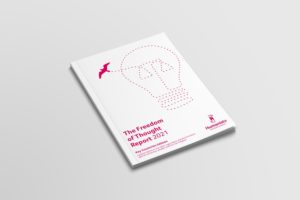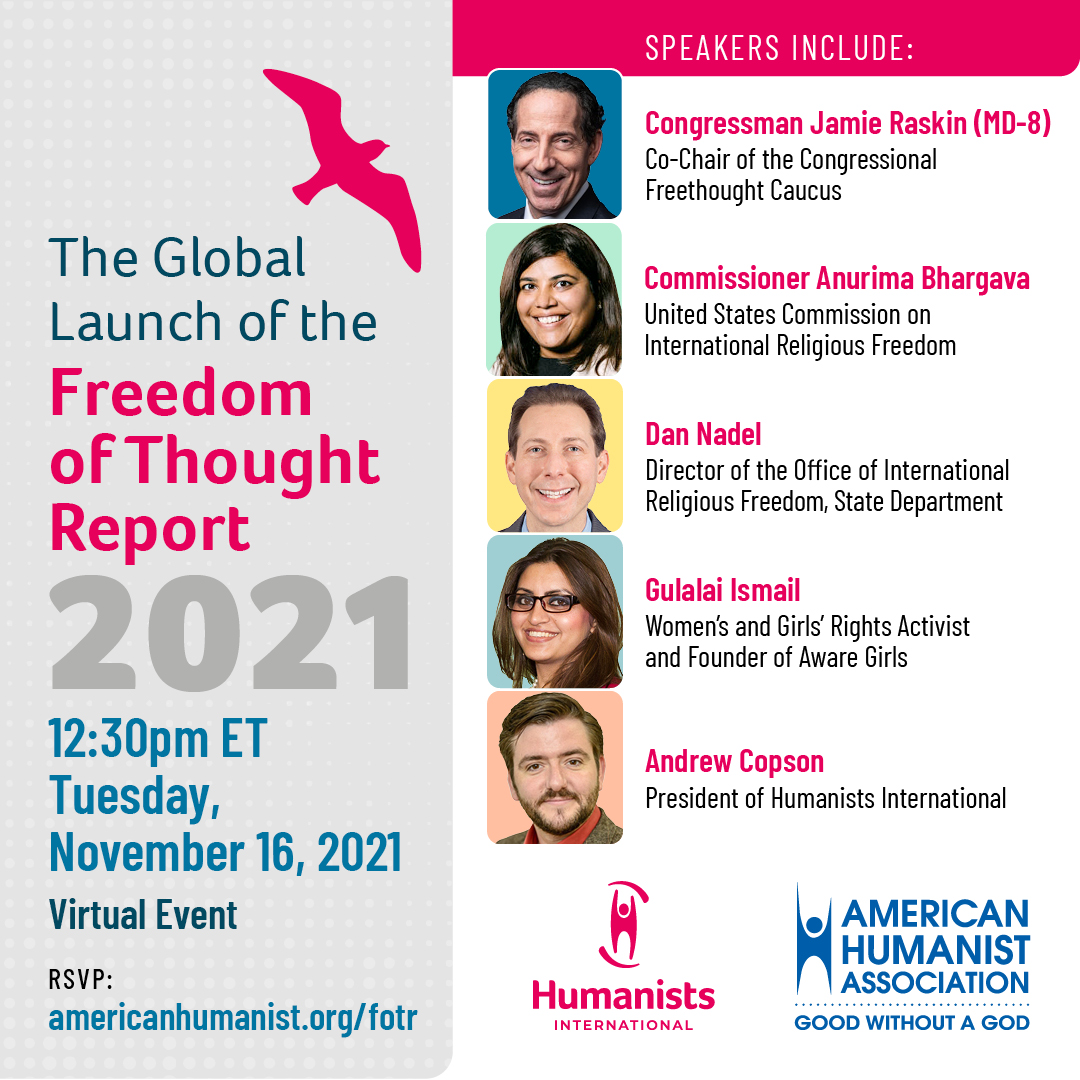Humanists International Looks at Freedom of Thought Around the Globe

On Tuesday, the American Humanist Association (AHA) hosted the 10th annual global launch of the Freedom of Thought Report, written and published by Humanists International. The event was held virtually with an array of inspiring speakers, including co-chair of the Congressional Freethought Caucus Congressman Jamie Raskin (MD-8), Commissioner Anurima Bhargava from the US Commission on International Religious Freedom, director of the Office of International Religious Freedom at the State Department Dan Nadel, women’s rights activist Gulalai Ismail, and President of Humanists International Andrew Copson.
Representative Raskin, the event’s Honorary Chair, made remarks while the other speakers participated in a panel discussion, moderated by AHA Director of Policy and Social Justice Rachel Deitch. The event concluded with a short Q&A session from the audience.
“It’s a shame that our government won’t even refer to freedom of religion and belief but has to talk about religious freedom or religious liberty,” said Rep. Raskin. “It’s not just about religion, it’s about people’s general mental, intellectual, and emotional freedom from state governed or state-sanctioned imposition on their right to believe as they see fit.”
 The Freedom of Thought Report is an annual publication that tracks the rights and treatment of nonreligious people and humanists around the world. In 2012, the AHA met with the US State Department Office for International Religious Freedom to discuss concerns about discrimination and human rights violations against humanists, atheists, and nonreligious people. The Office suggested submitting a detailed international report on said discrimination. With the help of the Center for Inquiry, International Humanist and Ethical Union (now renamed Humanists International), Secular Coalition for America, and more, the first Freedom of Thought Report was born.
The Freedom of Thought Report is an annual publication that tracks the rights and treatment of nonreligious people and humanists around the world. In 2012, the AHA met with the US State Department Office for International Religious Freedom to discuss concerns about discrimination and human rights violations against humanists, atheists, and nonreligious people. The Office suggested submitting a detailed international report on said discrimination. With the help of the Center for Inquiry, International Humanist and Ethical Union (now renamed Humanists International), Secular Coalition for America, and more, the first Freedom of Thought Report was born.
Today, the report is authored and published by Humanists International with contributions by other organizations and researchers. It’s an indispensable resource for policy-makers around the world and has garnered a reputation for dependable research, with an intersectional approach to human rights. As humanists, we understand the importance of data and evidence-driven policy work, and this report helps us accomplish that.
“Putting out these reports and this information creates an opportunity for a conversation,” commented Dan Nadel, director of the Office of International Religious Freedom at the US State Department. “We can look at these facts that are uncovered in these reports and start thinking of what types of policy interventions might be effective in addressing the underlying challenges that these reports illuminate.”
The report offers invaluable insights into the discrimination and persecution felt by nonreligious people and humanists globally. This year, two new boundary conditions were introduced, which help to capture areas of concern that may have been missed in the past. The first condition looks at unregulated conscientious objection while the other looks at the influence of religion in public life. Both boundary conditions highlight how the overpowering influence of religion in some countries allows for the infringement of rights on others, particularly women and LGBTI+ people.
Beginning this year, Humanists International reviewed one-third of all countries across the globe, as part of a rolling cycle of updates (previously, all countries were reviewed each year). Their Key Countries edition examines 15 of those countries, which for 2021 include recent developments in Myanmar, Afghanistan, and Uruguay. All country entries are available online, with a Watch List that contains 10 countries that have not been updated this year but continue to be monitored closely.
Every year a lot of information is compiled in the report, and much of it is quite grim. The report has found that humanists are discriminated against in 144 countries around the world resulting from a combination of things, including state legislation derived from religious law, blasphemy as a punishable offense, apostasy as a criminal offense, the barring of the non-religious from holding office, the difficulty or illegality of running an overtly humanist organization, and more. Our work is far from over.
The AHA is grateful to all of the speakers that joined us on Tuesday and we are honored to have hosted this year’s global launch event. We look forward to continuing to fight for religious freedom for all around the world.
We encourage you to explore the interactive report at https://fot.humanists.international/ to learn more. If you missed the launch event or want to watch it again, a recording can be found here.
